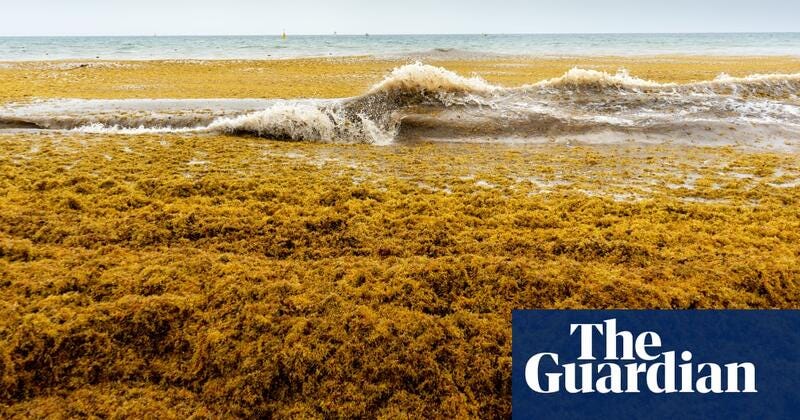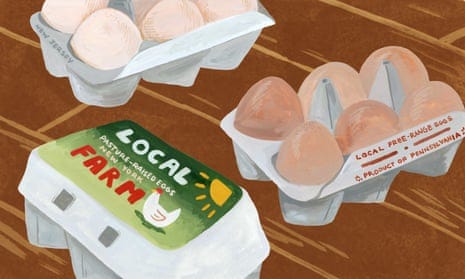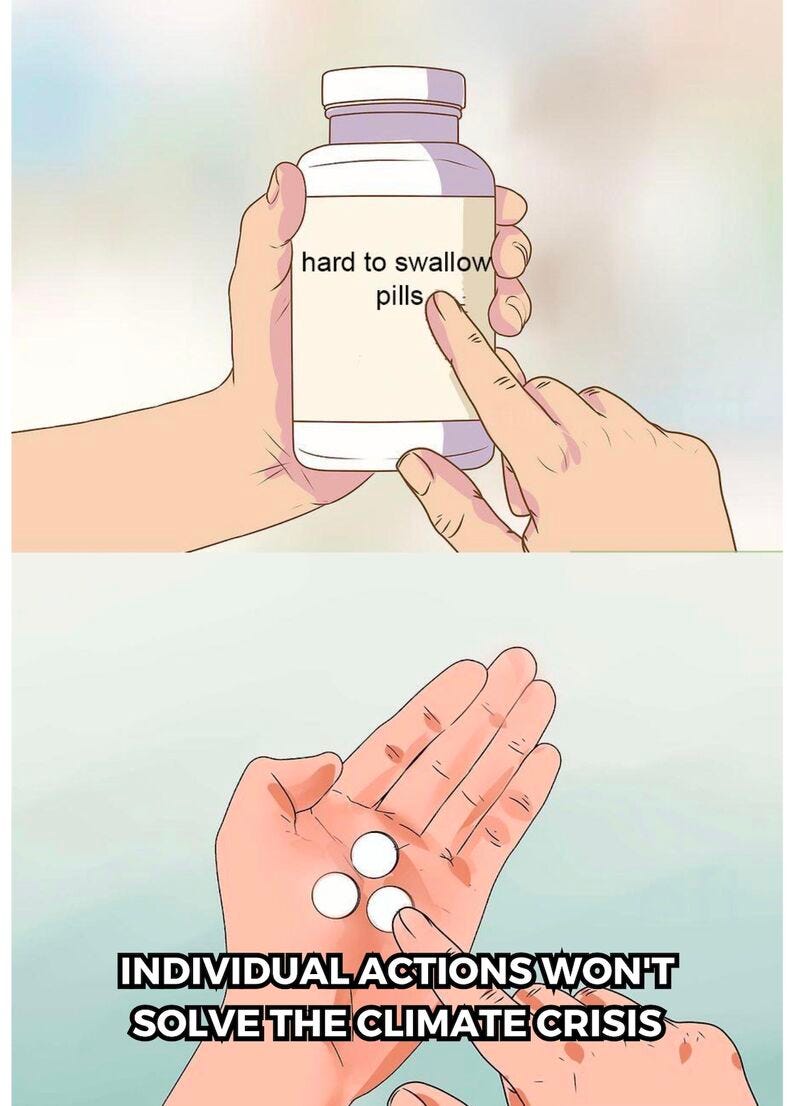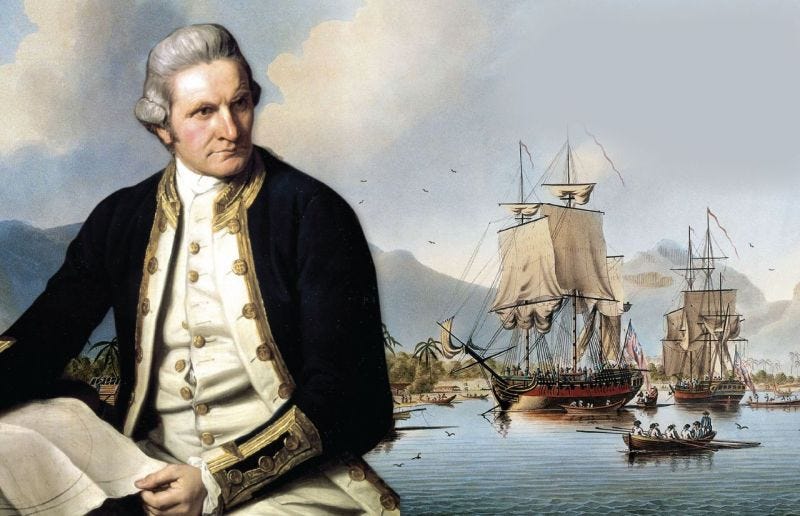Wrap-up W/E 9 June 2023
LEGACIES OF SELF-INTEREST. FRENCH SECULARISM. SEAWEED. LOCAL FOOD. CONMEN. LOVE. CRIMINALS. MR PRIGOZHIN. Tongue in cheek, all.
I have had my tongue firmly installed in my cheek this week. It’s a new tactic, aimed at pushing epiphany through comedy. But, I can assure you, it ain’t very funny.
Friday, five to five here’s your Crackerjack of epiphany.
Fay Reid’s Jobs
Fay E. A. Reid, over on Fay’s Newsletter, has been saying that she is usually in agreement with Robert Reich, another Substacker. I like Mr Reich and I like Ms Reid, but her words “as usual I am in agreement” made me stop and ponder before digesting the rest of her message. Time for a comment.
Hatred is a visceral reaction. It’s like love. You really can’t do much about it. But you can do quite a lot about stopping its effects.
What imbues American society is the all-pervading notion that there is something to be had for nothing. There is a widespread maxim that does the rounds, here in Europe and, I've no doubt, there in the USA, that “there is no such thing as a free lunch.”
Well, that is not true. Because Americans have had a lot of free lunches, and most of them come from having invaded and subjected a country that was, in fact, someone else’s. So did mine, Britain, where they’re hauling down statues and renaming roads to forget the honours paid to slave-owners in the past. I recommend the UK should be looking less at street signs and more at its GDP since, ooh, roughly the year 1650, I reckon.
Anyway, invasion and subjection, not to mention persecution, they are a part of American history; one that, along with importing vast quantities of manual labour from the countries that had fewer bows and arrows, the likes of Mr DeSantis want to draw a very thick veil over. Mr DeSantis is of the school that there is indeed very much a thing as a free lunch, and he is busy booking his free lunches right down to the day he falls from his perch, and he is promising free lunches to anyone who helps him.
The free lunch school (not, nota bene, the free school lunch) may be based on a complete and utter fallacy, for he who pays not the bill at the end of the lunch period may yet be saddled with the full whack of the bill for afternoon tea, but it is nonetheless one that is vastly favoured by those with a vast void in the space that occupies the distance between their left ear and their right ear. Yet the afternoon, yeah, it is far, far off in many people’s minds. Only “lunch” preoccupies them at the moment, and they reason: why, if we managed to get free lunches by nicking the First Nations’ land, and the First Nations’ livelihoods and piggy-backing on the rear-ends of Black imported labour for nigh-on two centuries, and piggy-backing on, quite honestly, anyone who’s been dumb enough to lift us on their backs since Jim Crow was reputedly (ha, ha) put to bed, why, then, should the same philosophy, if philosophy it be, not work to perfection now?
It will work, of that we can be assured. But whether or not it works to perfection remains to be seen.
America’s history has been spattered with the blood of too much “free money” (I learned the phrase from someone in California and have yet to fully understand what the hair-oil it means. Robbery, I reckon). The idea of caring and sharing has been perpetuated in the US only by those who need care and sharing, and it is that, a general absence of the notion that “everyone means every one”, that bogs down libertarian ideals in the US, and that gives Mr DeSantis the fillip to be so utterly callous in his approach to politics.
I wrote recently that there are but 200 sovereign nations on this globe. That means 200 governments. All we need is 200 individuals who are upright, honest, uncorrupt and ready to look at every one as being everyone to make our world perfect. There are 8,000,000,000 of us. And we cannot find 200. And Mr DeSantis certainly ain’t one of them.
Nice piece, but never say “as usual I agree with Mr Reich.” That makes you less of a critic and more of an acolyte. And that’s what Mr DeSantis has. Acolytes.
Image: bones of the dead at the Battle of the Greasy Grass — where Lieutenant Colonel George Armstrong Custer and 277 other US troops met their end, along with up to 300 First Nation tribesmen.
Secular France
I understand that France gets excited occasionally. About things like pension retirement ages and police brutality and other things that no one else has to bother with, especially police brutality. Instead, Britain has police britality, and perfectly acceptable retirement ages (for civil servants, and any servants who happen to also be civil).
But France also gets very excited — because it is a secular state (whose principal cathedral just happened to be struck by fire a few years ago) — that will not tolerate any effigy of saints, holy people and martyrs (except in Calais).
The prohibition against effigies, as set down in the law of the Bible, which is, admittedly, somewhat subservient to the law of France, actually applies to God only, and, what’s more, in France, effigies of the Prophet Mohammed in comics seem to be quite okay, secular state or no. The Belgians have an effigy of God in a church (of all the places) in Ghent and are very proud of it, because they charge hard-earned Christian cash for viewing it (cutely, not telling the viewers that they’ll be damned to purgatory for casting an eye on it).
So, all over France, we’ve been witnessing the disappearance of the Virgin Mary, the Virgin and Child and multifarious saints and saintesses from public endroits.
But what of Notre Dame? Not the afflicted cathedral in Paris, in this case, but the names of dozens, if not hundreds, of streets in the French Republic. This day (Tilleul in the church’s rural French calendar, nonidi the 19th of decade 26 of Prairial, in the revolutionary calendar, in case anyone’s keeping tabs), France is peppered with rues Notre-Dame, rues Notre-Dame de Lorette, rues Notre-Dame de Nazareth, rues du Val Notre-Dame, and so on and so forth, in Paris, Argenteuil, Aulnay-sous-Bois, Fontenay-sous-Bois, Rungis, Soisy-sur-Seine, Corbeil-Essonnes, Poissy, Meulan-en-Yvelines, Montlhéry and other delightful spots of interest dotted, as if sprinkled from an aspergillum, throughout the fifth republic.
Thank the Lord, oops, er — thank whatever is up there, that we don’t have to print A to Zs any more and just need to beware of bum steers from your satnav as France perchance enacts a new revolution this 21st century by expunging every last mention of religious idolatry from its street signs.
Wouldn’t want to be only half-revolting, now, would we?
Image (below): Rue Notre-Dame-de-Lorette in Epinal: work in progress, it would seem (Vosges matin).
Stinking seaweed is okay if it’s caused by industry
I don’t know if you had noticed, but OVAM, the Flemish waste agency, is currently running a campaign on LinkedIn, backed by push adverts featuring a dancing oriental gentleman.
I’ve been told to sort my waste, and I have done so for a long time. I believe in saving the planet, and they tell me that sorting my waste will help do that. However barely 20% of what I put into the recycle bins actually gets recycled so you’ll pardon me if I voice a certain scepticism regarding the value of sorting.
But the value of sorting, besides inculcating a sense of duty and honour in me to save the planet, is also the value of putting my sorted waste into the general waste, which costs me a small packet. They come along with that lorry once every fortnight and weigh how much I am putting into my black bin. And then they whack the charge off the 50 euros that I pay them every now and then to wheel my waste away.
Clearly, the financial measure of the charge for general waste is very much a stick to the carrot of saving the planet. But the fact is that sorting waste doesn’t save very much of the planet. Because of all the carbon credits that are being claimed by big oil, big gas and big everything else in order to pull the wool over the eyes of honestly operating citizens like me and you, who are dutifully sorting our waste, while they are claiming that useless world-saving projects on parts of the globe that they have absolutely no interest in offset the muck that they are producing on the parts of the globe that they are very much interested in, like the Arctic ice shelf.
There is no question but that sorting is a valid contribution to saving the planet and preserving us from irreversible climate change. But the point is: it just doesn’t work. Not when carbon credits and sulphur emissions and oil spills and the crude diesel fumes pumped out by the world’s shipping lines are all creating an ocean of waste, which is being gobbled up in plastic form by our marine life and causing huge sewage barriers of sargassum seaweed to wash up on our shores.
I don’t say don’t sort. But the hypocrisy that is practised by governments the world wide in forcing the little man to stand up to his duty to mankind, whilst letting the big man negate his, is, don’t you think, just a tad unfair?
(To see an article on stinking seaweed, click the pic. Apparently, this stuff can be seen from space (and, I reckon, those up in space may very soon be able to get a good whiff of it too).)
I tidied up and re-issued a few of older articles that I think are still of some relevance, and maybe you do too:
Assumptions about Russia: they're all we've got
When I interviewed for Saga Holidays, their mantra was “Make sure.” Making sure is not assuming. Because, says Saga, “Assume makes an ass out of u and me.” Ha, ha. However, assumptions are sometimes all we’ve got. But they should be expressed guardedly. Because we’re not sure. That’s why they’re
What is a principle?
When a country, any country, invades another country, whatever country, the country being invaded and lots of people who think like the country being invaded say things like: “That is contrary to the principle of sovereignty; the principles set down in the UN Charter, in the articles of war, in constitutions, in treaties, in agreements, in human rights, …
Enrichment through understanding
Wir reden an einander vorbei und treffen uns genau in der Mitte: We miss each other’s point, and meet precisely in the middle.
A child’s rhyme for a trick played like childsplay
Pat-a-cake, pat-a-cake, baker’s man,
Bake me a cake, as fast as you can,
Pat it, and prick it, and mark it with “A”,
And put it in the oven for those eight thousand miles Away.
Greece is the word; Turkey the bird
Greece is a member of NATO, but Cyprus isn’t. Cyprus’s status as a sovereign nation is disputed and has been disputed for half a century.
NATO is a defence alliance, but Turkey and Greece, both members of NATO, would be called upon to join forces to repel an attack on any European NATO member.
If, for 50 years, they have not been able to settle amicably their differences over Cyprus, what hope for a joint effort under NATO’s infamous article 5?
Does Turkey know what it wants? Does Greece? Does Cyprus? Does NATO? Does the EU? Do you? Or is there yet hope for the middle ground, in which all get shot, and none get saved?
Pick a name, any name (out of four)
It’s not often that a town’s citizens get to choose the name of their town, but the new local authority area of the combined districts of Ham and Tessenderlo in Belgium is putting the new name up for a ballot.
You can read in the article what’s up for grabs, but my own liking would go toward Tender Ham. Perhaps Flemish Minister-President Jan Jambon would be in favour of that.
(Click the pic — in Dutch.)
Beware of conmen. But how?
When I was young, I was told to watch out for conmen.
Was I conned into having a balanced diet, at the behest of grocers who want to see me buy Mars bars at the check-out, and told not to eat red meat?
Was I conned into sorting my waste, meticulously ripping cellophane off cardboard, to ensure each is recycled correctly?
Was I conned by a landfill park that has two weighbridges not calibrated to each other and that cannot weigh to anything closer than the nearest 5 kg?
Was I conned into washing my baked bean cans so that the metal would be the more valuable?
Was I conned by a power tariff that’s based on the most inefficient producer in the sector and whose price can never come down?
Was I conned into buying diesel due to the lies of a German car maker? And conned into selling my car because of a low emissions zone?
Was I conned into having a vaccination so that I could be kept tabs on?
Was I conned into buying alcohol-breath tests to drive 60km through France?
Was I conned into buying one blue-zone parking disc for each country in the EU?
Was I conned into supporting freedom and democracy in Ukraine, just as freedom and democracy are perishing in the European Union?
Was I conned into barely leaving the house for two years?
Was I conned into liking China and Russia?
Was I conned into believing in the independence of the judiciary?
Was I conned into buying Microsoft software, only now to be renting it?
Was I conned into believing in the general good?
What am I being conned into right now? To serve someone’s P&L account?
Or have I been conned enough now, and been put out in a sorted waste bin as “good only for unprofitable manual labour”?
When will I have been conned enough to mount a barricade, with my upper chest revealed, and a tricolour in my hands?
They tell me God is a con. But what else is there to believe in?
Was life just a con?
(Click the pic.)
I love me, who do you love?
There are loves that I have died for. Financially, and with a rebuked full commitment. But killing for love is an entirely different question. He who would kill for anything is incapable of love, other than of him, or indeed her, self.
But love is a fickle commodity. People love Beyoncé. They love the King. They love the English countryside. They love their mothers.
William Shakespeare reputedly used the word love in his canon of works to mean around 15 different things. David Crystal has said that there are as many English languages as there are people who speak it. I dare to assert that there are as many meanings of the word love as there are English-speakers who use it. And as many meanings as there are occasions on which it is used, for people are every bit as fickle as their use of the word love would betray.
Captain Cook, on his second voyage to the kingdom, took with him a linguist, who was to study the Tahitian language. The linguist was flummoxed to find that the Tahitian language possesses 13 words for love, all meaning something different. Perhaps they accord with more or less the 15 ways used by Shakespeare. Assuming, that is, that Tahitians are less fickle in their use of their 13 words than English-speakers are in their use of their one.
I find it hard to castigate the bravery with which Ukrainians are defending their homeland. But I do wonder whether their example may yet be taken up in more nefarious circumstances to justify the taking-up of arms against things that people elsewhere oppose, even when the opposition warrants less force than that which opposes Ukraine. Is Ukraine setting an example we may yet come to rue?
Belgium demands explanations
Belgium is going to ask Ukraine for an explanation of how come Belgian weapons are being used in the Russian region of Belgorod.
I assume they want an explanation of use by Ukraine of those weapons, and not by Russia. I hope they get the explanation that satisfies them, something like: We’re trying to win a bloody war here.
I do wonder if Belgium has demanded an explanation from Moscow on the use of Russian weapons in Ukraine. I suspect that, if they have, they will not have received a response quite so refined in its finesse as the one above, which I would expect from Kyiv.
I cannot actually see Russia declaring war on Belgium at this stage, but one can never count one’s chickens too late.
Wars would be so much simpler if politicians stayed out of them.
(Click the pic.)
Who are the criminals?
I am caught between a rock and hard place and it’s the Belgian judiciary that has put me here. I deprecate mob rule. I believe in the separation of powers. And I believe in the independence — and the accountability — of the judiciary. But, I was physically taken aback by the sentences handed down in the Sanda Dia case.
These demonstrators may — some of them — be demanding a role in the judicial process and, if they do, that is wrong. But many of them are expressing outrage that a private club has not properly been held to account for causing a death and, in that, I am with them.
A YouTube blogger has been banned for one week for revealing the names of the convicted. Not accused, but now convicted of a criminal offence, and the public may not know who they are, in order that their privacy can be protected. So, perchance, they might enter business life as innocent citizens, who have caused another man’s death?
The authorities are looking into what prosecution they can bring against the blogger for flouting their secrecy order. I think, instead, they should be inquiring into how a secrecy order comes to be allowed for convicted criminals. Mr Marc Dutroux might well be wondering the same thing.
I have four questions:
I own a bottle of fish sauce. It was bought by a visitor and left in my fridge. I didn’t know if it is a sauce made of fish or for serving with fish. I tried it one day. I added a few shakes to a soup, and rendered the soup inedible. It was so salty, I could not eat the soup. How much fish sauce do you administer to someone without knowing that this could seriously harm their state of health, such as by dehydrating them?
If a club declares its intention from the outset to engage in a deranged brutal year of activity, and that entails the death of one of their candidate members, then, whilst the intention to kill cannot be thereby presumed, in how far can one say that an intention to harm was absent in the club members’ (deranged) minds? In how far were they insouciant of the degree of brutality they went to?
Having set a candidate member’s health on such a decline that, when intervention is made to rescue him from his fate, it is too late to save his life, can that still be deemed to negate any accusation of culpable omission? Is acting too late still acting, then, when the act from which you wish to effect a rescue is of your own making?
Who are the criminals?
(Click the pic, and take your pick.)
Fusion cuisine. Nuclear fusion.
AliExpress is offering these matryoshka dolls from LuckyToy Store at €34.74 + €1.31 p&p (from China, you’ll be relieved to hear, not Russia), and jolly nice they are as well.
Whilst these particular examples are made in China, there is no question but that the matryoshka doll is a time-honoured, traditional, fancy goods object from Russia. Honoured by slightly less time than the matryoshka is Mr Yevgeny Prigozhin, the head of the Wagner private army, which is giving Russia’s national army a bit of a leg-up these days.
In a recent Guardian article, Samantha de Bendern looks at whether Mr Prigozhin is touting for the presidency of the Russian Federation, planning an armed coup, or simply being his usual outspoken self. Reports online suggest that, of all the people in Russia, the one body of them that always obey when Mr Prigozhin gives an order are his private army. And possibly his sous-chefs. Except when they turn around and shoot their own officers (the private army, that is, not the sous-chefs. Although …). Anyhow, none of said officers has to date included Mr Prigozhin, but, if the matryoshka means anything in the state of today’s Russia, it means that there is a long-standing tradition in that country of things not being entirely what they seem.
One thing that Mr Prigozhin himself says might not be quite what it seems is Russia’s nuclear capability. And he seems to be of the view that, if that has been maintained in anything like the state of upkeep of the rest of the Russian national army’s equipment, then there’s a good chance that it poses no threat whatsoever to Russia’s enemies or, for that matter, Russia itself (on the shoot your own officers theory).
I’ve never tasted Mr Prigozhin’s sauce, but I’ve certainly heard it, and so has Mr Putin. A false flag? A serious contender? A little chef, as grubby and insalubrious as a transport caff on the A6 Penrith by-pass? Or Russia’s great hope? If he is, I doubt he’s ours.
It would, of course, be ironic if, with the onlookers of the world treading so carefully on eggshells around Mr Putin for so long, it were only at a late stage of the game that the unprecedented consequences frequently alluded to by the Russian leadership end up being nothing more than a damp squib. That is indeed the big problem with matryoshka dolls. Nobody ever gets to the last one without twisting it in vain to see whether there is yet another one inside it.
Every chef knows: eggs get treated with the greatest of care and respect: right up to the moment when they’re whacked against the side of a frying pan.

















